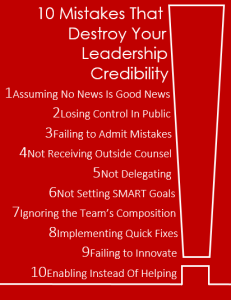
Learn From Your Mistakes: 10 Blunders Leaders Can’t Afford to Make
Every quality leader makes mistakes from time to time. In fact, if you think you are innocent of wrongdoing, that’s your first mistake!
There are two ways to gain wisdom:
- After falling down, brushing yourself off, and getting back on your feet
- Through education
It is beneficial to learn from your mistakes, but the best learning opportunity is avoiding the mistakes altogether.
Leadership Mistake #1: Assuming No News Is Good News
Leaders who aren’t interested in micromanaging often operate under the following premise: if team members need help, they’ll ask.
However, common sense wouldn’t allow that type of thinking in other areas of life. For example, car owners don’t wait for the motor to stop working before they change the oil. Patients don’t wait until they are on their deathbed to call in the doctor.
If leaders wait until their teammates ask for help, it could be too late.
Not only do leaders need to check in with their people, they need to schedule the meetings. Impromptu gatherings are inefficient because they don’t allow either party sufficient time to prepare, and they destroy everyone’s daily schedule.
Leadership Mistake #2: Losing Control In Public
Leaders who let their temper get the best of them in front of subordinates will suffer long-term consequences. Even just one public outburst can destroy the leader’s credibility and trustworthiness. There will be an immediate decrease in communication and a persistent fear of future blowups.
Leadership Mistake #3: Failing to Admit Mistakes
Mistakes will happen. How leaders deal with those mistakes is what will make or break their reputation.
The natural assumption is that acknowledging mistakes will make the leader appear weak and ineffective. It’s tempting to just hope no one noticed and pretend the blunder didn’t happen.
In reality, everyone already knows about the mistake and they are waiting to see how the leader is going to react.
Acknowledging a mistake won’t make things worse, but failing to deal with it will.
Leaders should admit to their blunder and report the applicable course of action. They should learn from the situation and move on.
When identifying personal shortcomings, leaders only need to disclose the necessary information. Team members simply need the leader’s acknowledgement; they don’t need to be burdened by excessive details.
Leadership Mistake #4: Not Receiving Outside Counsel
Adding one more thing to the daily to-do list seems impossible. However, there is something leaders absolutely must make time for: mentoring. Leaders need to provide counsel to some and, most importantly, receive it from others.
“If I hadn’t had mentors, I wouldn’t be here today. I’m a product of great mentoring, great coaching.” Indra Nooyi, the CEO of PepsiCo
Leaders also need to ask for critiques. Just as leaders review team members’ performances, the top of the pyramid should also be subjected to evaluation.
Individuals who are familiar with the leader’s responsibilities should provide feedback (this could be made publically or anonymously). Ask for suggestions on how to make improvements and avoid future setbacks.
Leadership Mistake #5: Not Delegating
Great leaders make things happen—through well-trained, properly-equipped teammates. Leaders might be capable of completing the task, but that isn’t their responsibility. It’s the leader’s job to appoint the right person to the right task.
Delegate the responsibility for completing tasks and the authority needed to get things accomplished.
Leadership Mistake #6: Not Setting SMART Goals

SMART goals are specific, measurable, attainable, relevant, and time-bound. Failing to set goals, or creating plans to achieve them, could lead to a successful team’s demise.
Leaders need to set specific goals that include direction, purpose, and ownership for accountability. Increase sales this year is not a SMART goal. Increase sales 27% by implementing a new online marketing campaign before December, 2015 is better.
Leaders need to set goals for subordinates and themselves. Then, there needs to be follow-up to ensure those goals are met.
Leadership Mistake #7: Ignoring the Team’s Composition
Individuals’ personalities, skills, and qualifications evolve over time. It is important to check in periodically to ensure the team’s composition is still ideal.
Are the wrong people on the train, or are they just sitting in the wrong seats?
Leadership Mistake #8: Implementing Quick Fixes
Even the most challenging situations have a quick-fix option. It is tempting to implement these strategies rather than wait for the lasting solution to develop. While quick fixes do serve their purpose, implementing them too often is detrimental.
Not only does this problem-solving strategy diminish long-term success, it also damages the leader’s reputation. Team members see the leader’s unwillingness to adequately fix the problem. This strategy seems shortsighted and points to the leader’s inefficient.
Leadership Mistake #9: Failing to Innovate
Albert Einstein defined insanity as doing the same thing over and over again and expecting different results.
Leaders must anticipate change, create a plan to address the change, and take action before it arrives. If leaders are forever reacting to change rather than taking the opportunity to innovate, they’ll never be viewed as a success.
Leadership Mistake #10: Enabling Instead Of Helping
A popular parenting article addressed the difference between enabling and helping:
Helping is when you do something for someone who cannot do it himself, and enabling is when you do something for someone who is very capable of doing it himself.
Leaders who are dedicated to the task of problem-solving can easily blur the line between enabling and helping. In an effort to resolve the problem as quickly as possible, a leader could do things for people who are perfectly capable of doing those tasks themselves.
Overstepping these boundaries diminishes the leader’s ability to lead, creates unnecessary burnout, and does a severe disservice to the teammate.
Enhance Leadership Skills Through Education, Not Trial-and-Error
George Bernard Shaw was right: a life spent making mistakes is not only more honorable, but more useful than a life spent doing nothing.
However, it is advantageous to avoid both mistakes and a life spent doing nothing whenever possible.
